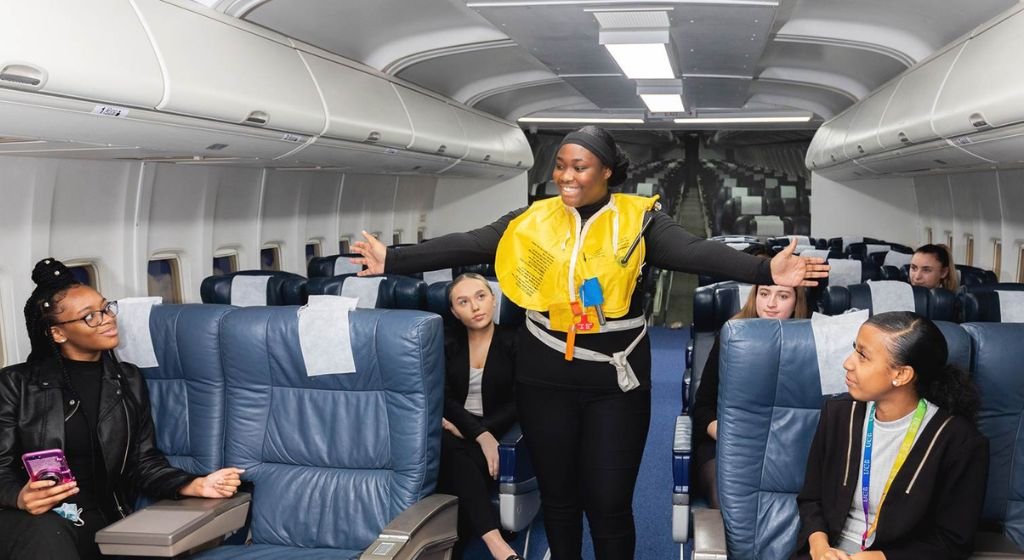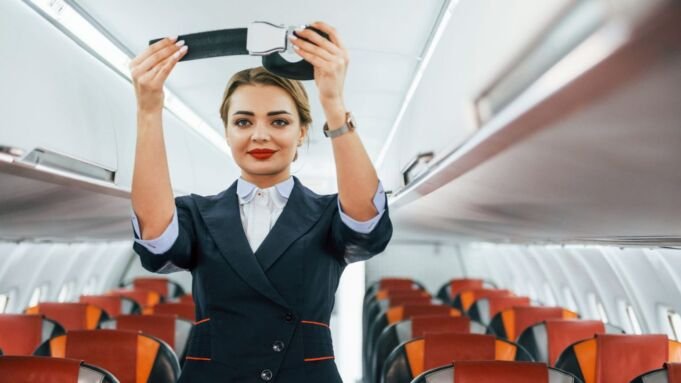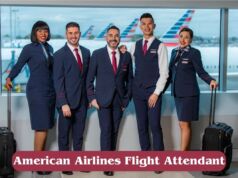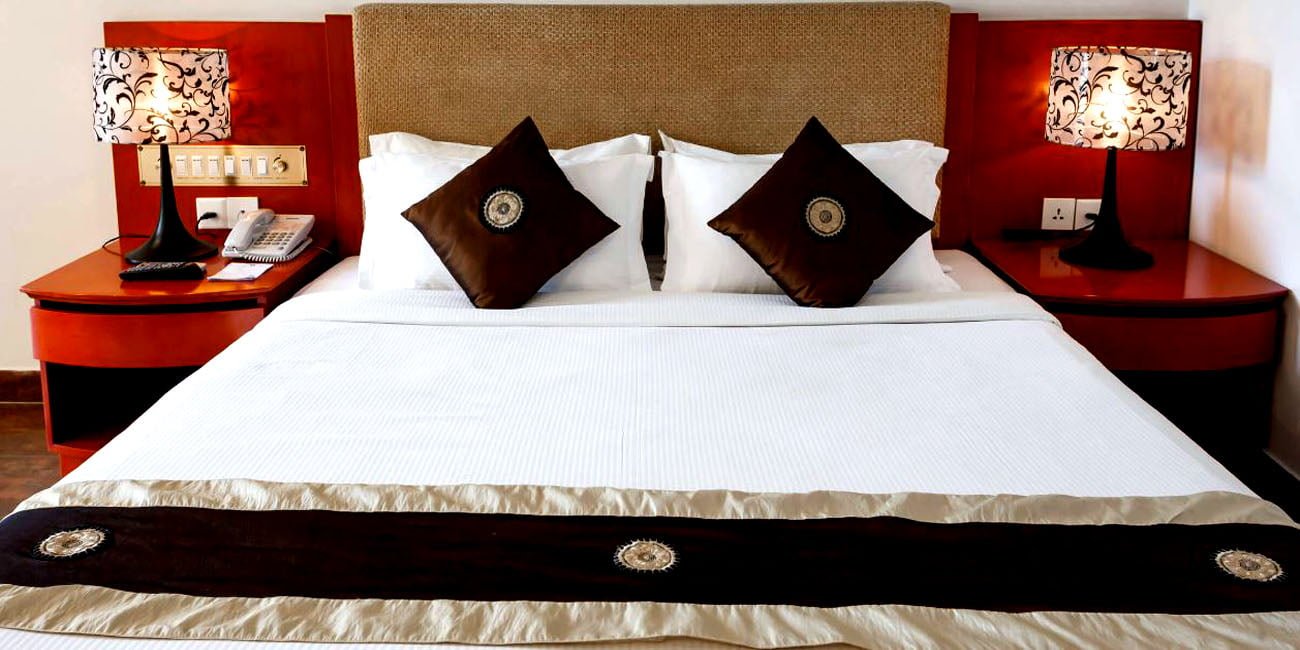Flight attendant school, also known as a flight attendant training program or academy, is designed to prepare individuals for a career in aviation. These programs provide hands-on training and simulated work environments to teach students the skills necessary to become successful flight attendants.
Some airlines offer their training programs, while others require applicants to attend an accredited flight attendant school before applying for a position.
By attending flight attendant school, you’ll learn everything from safety protocols and emergency procedures to customer service and hospitality. You’ll also gain the knowledge and skills necessary to handle challenging situations and provide exceptional service to passengers.
If you’re ready to embark on an exciting career in aviation, attending flight attendant school is the first step. In this article, I’ll share the requirements for becoming a flight attendant and the benefits of pursuing this rewarding career.
Are Flight Attendant Schools Worth It?
Yes, flight attendant schools can be worth it for certain individuals. Attending a flight attendant school can provide you with the necessary skills and knowledge to succeed in a career as a flight attendant. Flight attendant schools offer courses that focus on customer service skills, safety procedures, and the travel industry.
If you are interested in a career as a flight attendant but have no prior experience, attending a flight attendant school can be a great way to gain valuable knowledge and skills. Additionally, flight attendant schools can help with job placement after graduation, providing you with connections to airlines and the travel industry.
Flight Attendant Schools Admission Process
Enrolling in a flight attendant school is an excellent place to start if you’re interested in working as an airline employee. All facets of the job, including customer service and safety protocols, are covered in detail in flight attendant schools. All the information you require regarding flight attendant school admissions is provided here.
Eligibility Criteria
Flight attendant schools have varying eligibility criteria. Some schools require a high school diploma or equivalent, while others require a bachelor’s degree. Additionally, some airlines have specific requirements for their flight attendants, such as height requirements. Before applying to a flight attendant school, make sure you meet the eligibility criteria.
Application Steps
The application process for flight attendant schools typically involves submitting an online application, along with a resume and cover letter. Some schools may also require a personal statement or letters of recommendation. Make sure to review the application requirements and provide all requested information carefully.
Selection Process
After submitting your application, the flight attendant school will review your application materials and determine if you meet their eligibility criteria. If you do, you will be invited to an interview. The interview may be conducted in person or via video conferencing. During the interview, the school will assess your communication skills, customer service skills, and ability to work in a team. If you pass the interview, you will be accepted into the flight attendant school.
Keep in mind that attending a flight attendant school does not guarantee a job with an airline. However, attending a reputable flight attendant school can give you an advantage in the airline hiring process. Many airlines have partnerships with flight attendant schools and actively recruit graduates.
Related Read: Delta Flight Attendant
Curriculum and Coursework
Flight attendant schools offer a comprehensive curriculum that covers safety procedures, customer service training, emergency response training, and aircraft familiarization. The coursework is designed to prepare you for the important responsibility of ensuring passenger safety and comfort during flights.
Safety Procedures
Safety is the top priority for any flight attendant training program. You will learn about the safety regulations set by the Federal Aviation Administration (FAA) and how to implement them during flights. The training will cover topics such as emergency exits, oxygen masks, and seat belts. You will also learn how to handle medical emergencies and provide first aid to passengers if needed.
Customer Service Training
Flight attendants are the face of the airline and are responsible for providing excellent customer service to passengers. You will learn how to interact with passengers, handle their requests, and provide assistance with boarding and disembarking. The training will also cover airline customer service policies and procedures.
Emergency Response Training
In case of an emergency, flight attendants play a critical role in ensuring the safety of passengers. You will learn how to handle emergencies such as fires, equipment failures, and other incidents. The training will include hands-on experience in fighting fires and using emergency equipment.
Aircraft Familiarization
Flight attendants must be familiar with the aircraft they are working on. You will learn about the different types of aircraft, their features, and how to operate the equipment on board. This training will help you to provide better service to passengers and ensure their safety during flights.
Flight attendant training programs offer a well-rounded curriculum that covers safety and customer service. The training is designed to prepare you for the important role of a flight attendant and help you to provide a comfortable and safe flying experience to passengers.
Read More: Southwest Airlines Flight Attendants
Flight Attendant Practical Training

If you’re considering a career as a flight attendant, it’s important to choose a program that offers practical training to help you gain confidence and hands-on experience. The best flight attendant schools offer a combination of classroom instruction and practical training, which can include in-flight experience and simulator sessions.
In-Flight Experience
Some flight attendant schools offer accelerated flight attendant programs that include in-flight experience with partner airlines. This allows you to gain hands-on experience in a real-world setting, working alongside experienced cabin crew members and interacting with passengers.
In-flight experience can help you develop essential skills such as communication, problem-solving, and customer service. It also provides an opportunity to practice safety procedures and emergency protocols in a realistic environment.
Simulator Sessions
Another important aspect of practical training is simulator sessions. Flight attendant schools often have access to simulators that replicate the experience of working on an aircraft. Simulator sessions can help you develop skills such as emergency response, communication, and teamwork.
During simulator sessions, you may practice responding to various emergency scenarios, such as a fire or medical emergency. You may also practice serving passengers, handling difficult situations, and working with other members of the cabin crew.
Read More: Philippine Airlines Flight Attendant
Skill Development
If you want to succeed in flight attendant school, there are several skills that you need to develop. These skills will help you to excel in your coursework and prepare you for a successful career as a flight attendant. Here are some of the key skills you should focus on:
Communication Skills
Communication skills are essential for any flight attendant. You will need to be able to communicate effectively with passengers, crew members, and other airline personnel. This includes being able to speak clearly and concisely, as well as being able to listen actively and respond appropriately to questions and concerns. You’ll also need to be able to communicate effectively in writing, as you may need to write reports or memos.
Teamwork and Leadership
As a flight attendant, you will be part of a team that works together to ensure the safety and comfort of passengers. This means that you need to be able to work well with others, take direction from your superiors, and provide leadership when necessary. You should also be able to resolve conflicts and make decisions under pressure.
Cultural Sensitivity
In today’s global society, it is essential to be culturally sensitive. As a flight attendant, you will interact with people from all over the world, each with their own unique customs and traditions. You will need to be able to adapt to these differences and show respect for other cultures.
Physical Fitness
Being a flight attendant can be physically demanding. You will need to be able to stand for long periods, lift heavy objects, and maneuver through tight spaces. You should be in good physical condition to handle the demands of the job.
By developing these skills, you will be well-prepared for a successful career as a flight attendant. Remember to focus on skills to succeed, customer service skills, teamwork, leadership, cultural sensitivity, and physical fitness.
Career Opportunities
The travel industry offers a range of positions for flight attendants, from entry-level positions to senior management roles. Many airlines offer career services to help flight attendants advance in their careers, such as training programs, mentorship opportunities, and leadership development programs.
As a flight attendant, you will have the opportunity to travel to different destinations and experience new cultures. You will also have the chance to meet new people and make connections with fellow flight attendants and passengers.
In addition to the travel benefits, flight attendants can enjoy competitive salaries and benefits packages, including health insurance, retirement plans, and travel discounts.
If you are interested in pursuing a career as a flight attendant, it is essential to research the requirements and qualifications for the position. Many airlines require a high school diploma or equivalent, fluency in English, and the ability to pass a background check and drug test.
Also Read: Flight Attendant Salary
How much does flight attendant school cost?
If you’re considering a career as a flight attendant, one of the first questions you may have is how much does flight attendant school cost? The cost of flight attendant school can vary greatly depending on the type of program, its duration, and location.
Generally, flight attendant schools can cost between $1,000 and $25,000. The average cost of flight attendant school programs in 2019 is $3,500 to $5,000. However, some programs cost as little as $1,500 and others can cost upwards of $10,000.
It’s important to note that some flight attendant schools may require additional fees for room and board since you’ll be living nearby as you train. Additionally, some airlines may offer their training programs for free or at a reduced cost, so it’s worth researching your options before committing to a specific school.
Here’s a breakdown of the approximate cost of flight attendant school based on program type:
| Program Type | Approximate Cost |
| Online Course | $1,500 – $3,000 |
| Community College Program | $5,000 – $10,000 |
| Private School Program | $10,000 – $25,000 |
Keep in mind that these are just rough estimates and the cost can vary depending on the specific program. It’s important to thoroughly research your options and compare costs before making a decision.
How Long Does It Take to Learn to Be a Flight Attendant?
If you are interested in becoming a flight attendant, you might be wondering how long it takes to learn the skills and knowledge required for the job.
The answer to this question is not straightforward, as it depends on several factors, such as the type of training program you choose and your previous experience in the aviation industry.
Generally, flight attendant training programs can take anywhere from a few days to several weeks to complete. Some schools offer accelerated flight attendant programs that can be completed in a shorter amount of time. Online flight attendant schools are also becoming more common, allowing you to learn the necessary skills from the comfort of your own home.
Is Flight Attendant Training Difficult?
Yes, flight attendant training can be challenging. It requires a lot of dedication, hard work, and commitment. However, with the right preparation and mindset, it is definitely possible to pass.
One of the biggest challenges of flight attendant training is the length of the program.
Most programs last between 4-8 weeks, and during this time, trainees are required to learn a lot of information about safety procedures, customer service, and emergency protocols.
Another challenge of flight attendant training is the rigorous testing process. Trainees must pass a series of exams and assessments, which can include written tests, oral exams, and practical demonstrations. These tests are designed to ensure that trainees have a thorough understanding of the material and are prepared to handle any situation that may arise during a flight.
Despite these challenges, many people find flight attendant training to be a rewarding and fulfilling experience. It is a great way to learn new skills, meet new people, and travel the world. With the right attitude and preparation, anyone can succeed in flight attendant training.
To Know More: American Airlines Flight Attendant
Is it hard to pass flight attendant school?
Yes, passing flight attendant school can be challenging, but it is not impossible. The level of difficulty can vary depending on the training program and your strengths and weaknesses. However, most reputable training programs offer support and additional opportunities for those who may need extra help.
Flight attendant school typically covers a wide range of topics, including safety procedures, customer service, and emergency response. You will be required to pass various assessments throughout the training program, such as written exams, practical demonstrations, and role-playing scenarios.
These assessments are designed to test your knowledge, skills, and ability to handle different situations that may arise during a flight.
To increase your chances of passing flight attendant school, it is important to come prepared and stay focused throughout the training program. This may involve studying course materials in advance, practicing your communication and problem-solving skills, and seeking help from instructors or peers when needed.
Frequently Asked Questions (FAQs) about Flight Attendant School
How long does it take to complete flight attendant training?
The length of flight attendant training varies depending on the program. Some programs can be completed in as little as a few weeks, while others may take several months. However, most programs last between 4-8 weeks.
What are the requirements for enrolling in a flight attendant school?
The requirements for enrolling in a flight attendant school vary depending on the school. However, most schools require that you are at least 18 years old, have a high school diploma or GED, and are fluent in English. Some schools may also require you to pass a physical exam and have a certain level of physical fitness.
Do most people pass flight attendant training?
Most people who enroll in flight attendant training programs complete the program and go on to become flight attendants. However, the training can be challenging, and not everyone will pass. It is important to be prepared and committed to the program.
Can international students attend flight attendant schools in the United States?
Yes, international students can attend flight attendant schools in the United States. However, they must have a valid student visa and meet the school’s admission requirements.
Are there any airlines that offer sponsorship or payment for flight attendant training?
Some airlines offer sponsorship or payment for flight attendant training. However, these programs are typically highly competitive and may require a commitment to work for the airline for a certain amount of time after completing the program.
What should one expect in terms of difficulty and challenges during flight attendant training?
Flight attendant training can be challenging both physically and mentally. You can expect to learn a lot about safety procedures, customer service, and emergency protocols. You may also be required to participate in physical training and practice evacuations.
Is attending a flight attendant school beneficial for a career with airlines?
Attending a flight attendant school can be beneficial for a career with airlines. It can provide you with the necessary skills and knowledge to become a successful flight attendant. However, it is important to note that attending a flight attendant school does not guarantee employment with an airline.
Conclusion
Congratulations! You now have a solid understanding of what flight attendant school is, what it entails, and what you can expect from it. You have learned about the curriculum, requirements, and job placement assistance offered by flight attendant schools. You also know how much it costs to attend these schools and what factors to consider when choosing one.
Remember, becoming a flight attendant is a rewarding career that requires hard work, dedication, and a passion for travel. It’s a job that offers unique experiences, challenges, and opportunities for personal growth. By attending a flight attendant school, you can gain the necessary skills and knowledge to succeed in this exciting field.
So, whether you’re just starting your career or looking to make a change, consider attending a flight attendant school. With the right training and preparation, you can take your first step toward a fulfilling and exciting career in aviation.
Thank you for taking the time to read this article. I hope you found it informative and helpful. If you have any questions or comments, please feel free to leave them below. Don’t forget to share this post with your friends and family who may be interested in attending flight attendant school.



![What Does Aviates Stand for in Aviation? [The Art of Flying] Aviates](https://tourinplanet.com/wp-content/uploads/2024/07/Aviates-238x178.jpg)


![What is The Marvelous VFR C500? – [Key Features and Overview] Marvelous VFR c500](https://tourinplanet.com/wp-content/uploads/2024/07/Marvelous-VFR-c500-238x178.jpg)



![What Does Aviates Stand for in Aviation? [The Art of Flying] Aviates](https://tourinplanet.com/wp-content/uploads/2024/07/Aviates-100x75.jpg)














![25 Best Peruvian Foods You Must Try In Peru [With Recipes] Peruvian Food](https://tourinplanet.com/wp-content/uploads/2024/07/Peruvian-Food-100x75.jpg)


